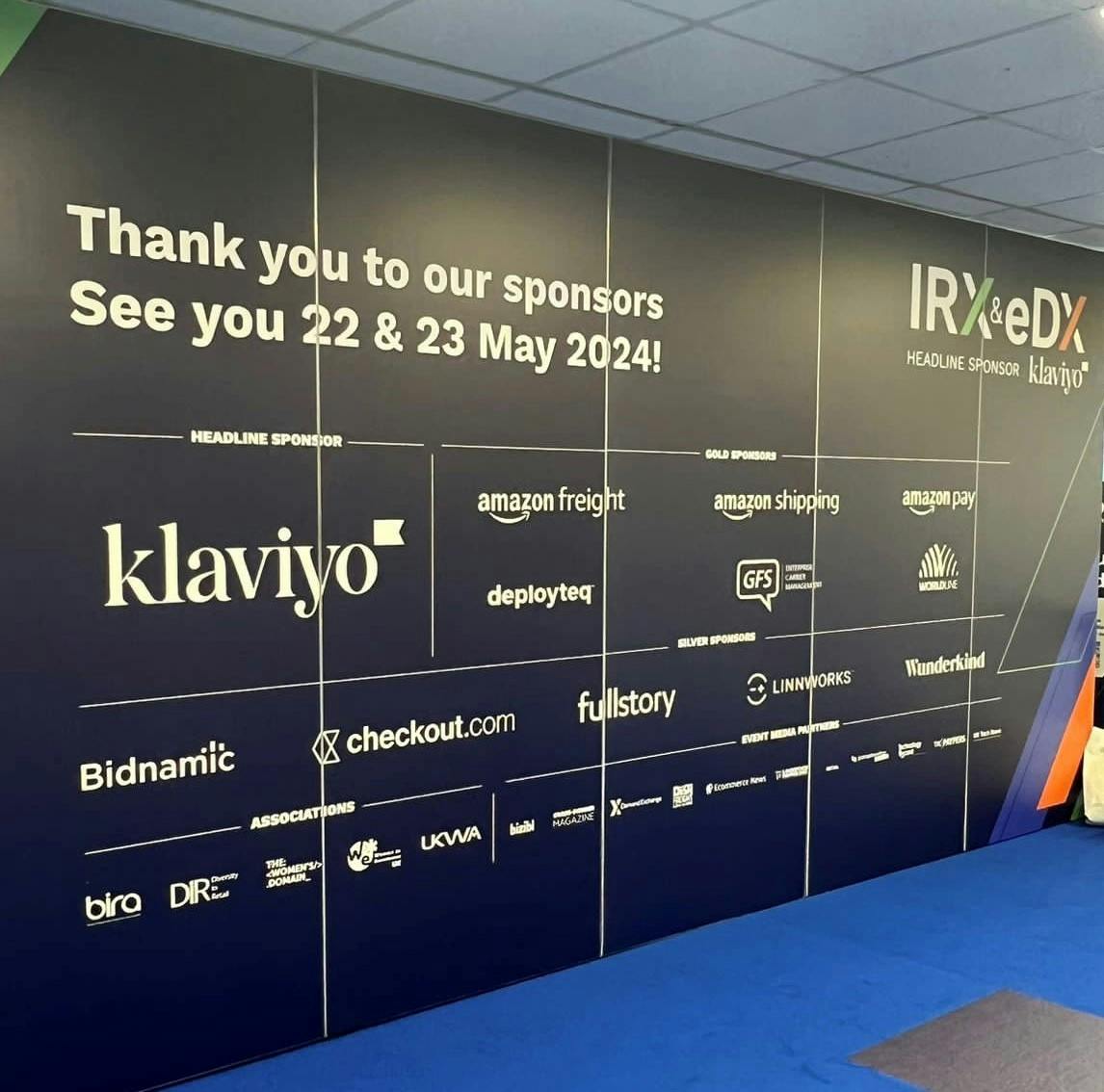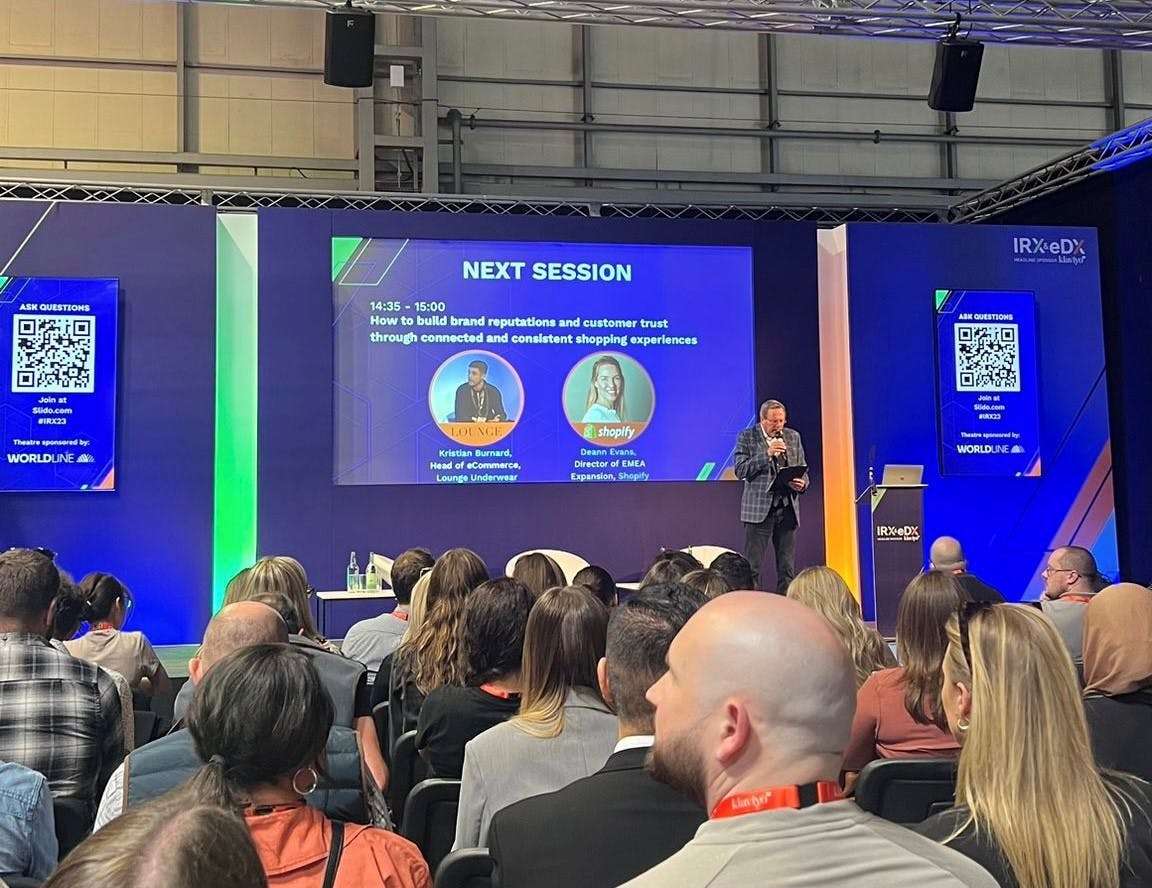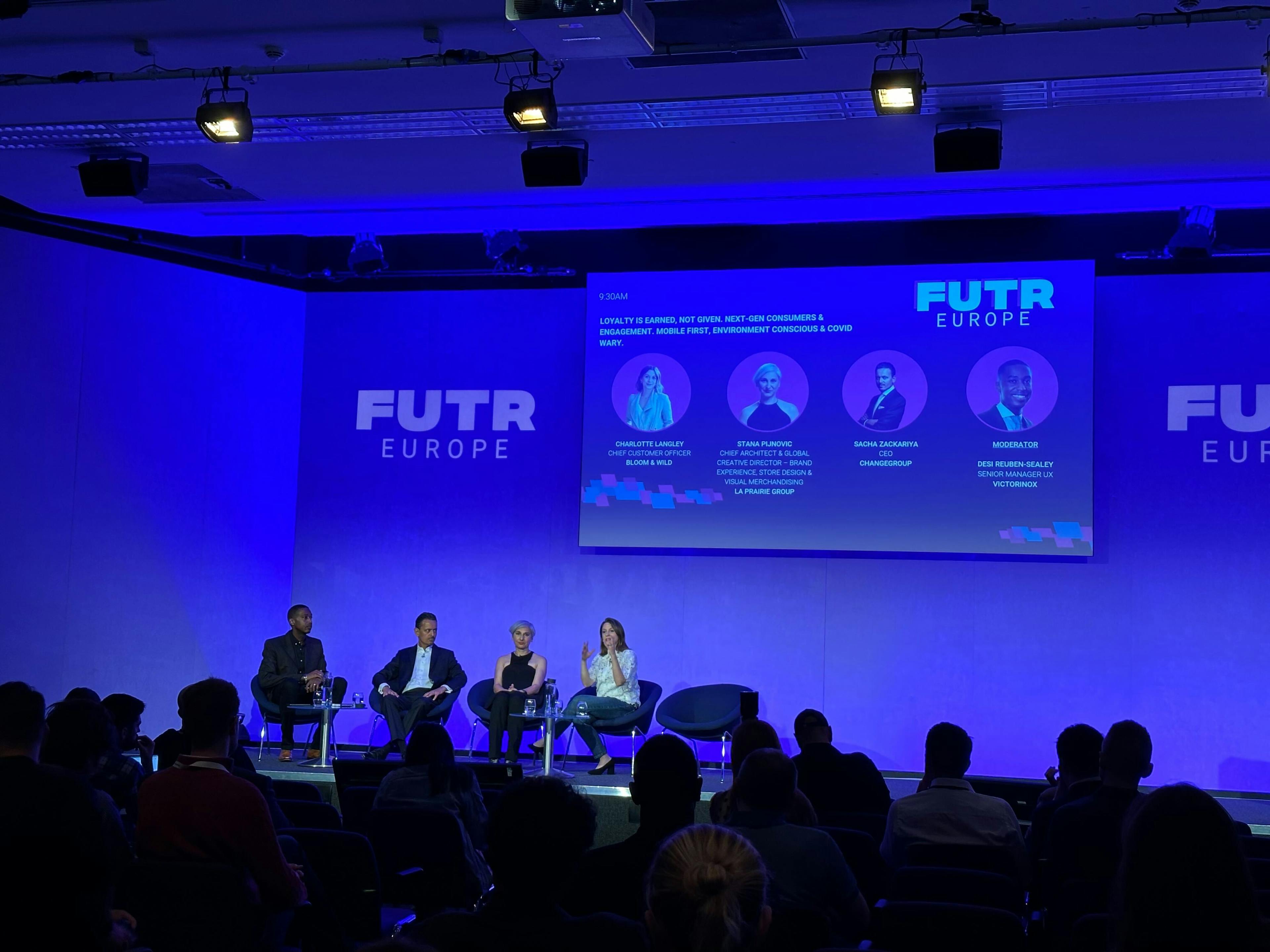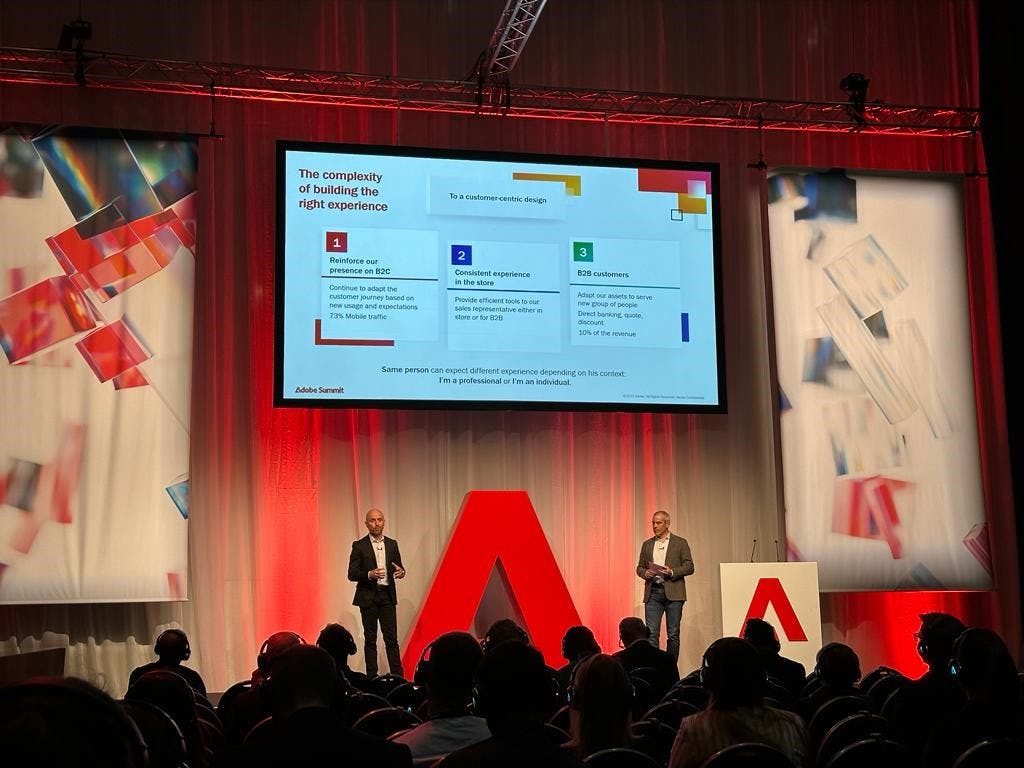Last week, our team attended the Internet Retailing Expo as it returned to the NEC Birmingham. We were ready to dive into the dynamic world of online retail and discover the latest trends, strategies, and technologies that are reshaping the way our industry moves, as the UK ecommerce ecosystem was brought together again under one roof.
As well as being a hub for networking, every year IRX provides an opportunity to hear talks from some of the most successful online brands in the UK, bringing together visionary retailers, forward-thinking brands, and innovative solution providers. This expo serves as an environment for thought leaders, entrepreneurs, and professionals seeking to stay ahead of the curve, to tap into the endless possibilities offered by the digital marketplace.

However, as we ventured into this exciting event, we appreciated not all merchants would have the time, budget, or resource to take 2 days out of the working week to attend. Luckily, we are happy to be the eyes and ears on the ground and we have compiled the six key takeaways and learnings from IRX 2023 in this quick-to-read blog.
Whether you are a seasoned ecommerce manager, a solutions provider or an aspiring entrepreneur looking to launch your online brand, our blog can be your go-to resource for exclusive insights, expert tips, and hot industry trends we learnt during our time at IRX.
So, buckle up and get ready to embark on a thrilling exploration of IRX 2023 with us, where we uncover the data driven secrets to success in a digital retail revolution full of loyalty, community, and sustainability. Let’s unlock the limitless potential of the internet retailing world together with these six key theme takeaways:
1. Data-driven decisions
One of the key themes at IRX was making decisions driven by data. Giles Smith, Head of Digital (Customer and Data) at Selfridges, gave an interesting talk on Selecting, sequencing, and succeeding with digital tech transformation, with the key takeaway being customers are unforgiving and less loyal in the modern environment. This means having stability and good CX is simply not acceptable anymore. Brands need to understand the role of data analytics and customer insights in shaping ecommerce strategies.
Many brands at IRX highlighted cutting-edge tools and methodologies to leverage customer data effectively, enabling retailers to understand shopping patterns, predict consumer behaviour, and make data-driven decisions to enhance overall performance. Mario Tarantino in particular, Head of ecommerce at Huel, covered the importance of data and testing ahead of deployment of new features. Huel took data and insights from customer reviews in order improve upon their services and introduce a new offering onsite. They did this through utilising the following tech stack; Heap Analytics, ContentSquare, ABTasty, Snowflake and thoughtspot. Off the back of the analytics and testing, Huel created a mix and match bundle offering on-site, which was built on React.
2. The importance of brand community
Omnichannel strategies also took the limelight, as retailers discussed the importance of seamless integration between physical and digital touchpoints to create a brand community. Attendees were shown novel ways to bridge the gap between online and offline retail, such as implementing in-store digital experiences, leveraging mobile apps for enhanced customer engagement, and optimising supply chain management.
A tactic Lounge Underwear leveraged and discussed was about how they used pop up stores as a base for lots of experiential activity with student consumers. This helped enhance brand perception for Lounge as they wanted to grow their presence online but get the product in new customers hands first and build a loyal student consumer base.

UK-owned online lingerie brand Lounge opened its first-ever Manchester-based retail pop up space earlier this year in February 2023.
3. The importance of delivery
The emphasis on delivery at IRX 2023 reflects the critical role it plays in shaping customer satisfaction, loyalty, and overall shopping experiences. By focusing on efficient, reliable, and sustainable delivery solutions, brands can aim to meet and exceed customer expectations in the fast-paced world of ecommerce.
Retail Economics completed a survey that saw 25% of UK shopping experiences are ending in cart abandonment, this means a £7.2 billion loss in sales. The results they shared highlighted that friction with the journey around delivery is as important in the pre-purchase stage as it is at checkout.
It was evident in the findings that young age groups in particular want choice in their delivery experience, and younger customers have often created a brand affinity with specific couriers; having those they do and don’t like. This means that a brands choice in courier can potentially put customers off purchasing all together.
The survey, which was published in The Retail Times, also disproved some big ecommerce myths. These myths being:
Consumers are not willing to pay for premium options.
Consumer will not pay for returns.
They also discussed some pretty big barriers to offering more delivery and choice with cost and overhead of working with multiple carriers seen as the main barriers to wider delivery solutions. It was very clear to us that this higher demand for delivery was leading to a massive surge in tech partnerships causing brands to focus on enhancing delivery transparency by providing real-time tracking information to customers. By leveraging technologies such as GPS tracking and automated notifications, brands can keep customers informed about their order status, estimated delivery time, and any potential delays.
"Retailers must break with traditional delivery approaches to meet customer expectations and prevent lost sales."
RetailEconomics
4. Sustainability in ecommerce
Sustainability and ethical practices were significant focal points at IRX, with many exhibitors highlighting their commitment to eco-friendly packaging, supply chain transparency, and responsible sourcing. Brands such as Boden recognise the growing demand for environmentally conscious practices and showcased innovative solutions to reduce their carbon footprint while meeting consumer expectations.
It was also mentioned that not enough time is being spent on educating customers on how to actually make better, more sustainable decisions with their purchases, instead, too much time is spent on inspiring them, which is great but not all that practical when they actually want to start acting and being the change.
There are 3 types of consumer to consider when it comes to sustainability;
Consumers who ONLY shop with sustainable brands,
Consumers who understand that they need to do more as a consumer but is still not placing sustainable brands in their top 5 priorities,
Those that do not get it at all.
Brands moving forward need to understand and adapt their efforts to attract all three types of consumer.
5. Building trust and loyalty
Building trust and loyalty was another key theme at IRX 2023; recognising the importance of cultivating strong customer relationships, many exhibitors and speakers focused on strategies to establish trust and foster loyalty in the online retail space.
One prominent aspect was the emphasis on transparent and ethical practices. Brands showcased their commitment to providing accurate product information, transparent pricing, and reliable customer service. By being upfront and honest with customers, brands can build trust and credibility, ensuring that shoppers feel confident in their purchase decisions.
Brands focused on leveraging various channels, such as social media, email marketing, and live chat, to interact with customers, address their concerns, and provide exceptional post-purchase support. By actively engaging with customers and being responsive to their needs, ecommerce brands can foster a sense of trust and loyalty.
Kristian Burnard, Head of Ecommerce at Lounge Underwear, gave a fantastic example of having four separate homepages for user journeys from each of their paid channels to ensure a consistent user journey and to deal with channel specific obstacles that can affect loyalty. For example, TikTok are super strict about bare flesh in their ads so they created assets and content that mean the homepage users drop into is consistent.

6. Customer research and audience segmentation
The importance of customer reviews, segmentation, and social proof was also highlighted this year. Exhibitors showcased tools and strategies for collecting and displaying customer feedback and testimonials, recognising that positive reviews and recommendations from fellow shoppers can significantly influence purchasing decisions and build trust in a brand.
Creed have seen a 50% uplift in online sales after they became ‘insight led’. This was a big project led by their CRM Manager, who began conducting a wide-scale research project to gain more insights into the Creed database, which comprises of 260,000 customers. They are now using yearly surveys to gain qualitative insights into their customers wants and needs. Interestingly, no incentives are offered to take part in the survey in order to keep the results more organic. They have also started collecting reviews from Yotpo which allows them to see what is and isn’t working well for the brand online.

One of our favourite talks was by Leon Grant, EMEA Sales Manager at Klaviyo, and Nina Machin, Creative Lead at Tatti Lashes. Tatti Lashes is the UK’s fastest growing lash company with a database made up of 600k consumers (with a split between MUA’s, eyelash technicians, and everyday consumers). Their newsletter was making up 10% of revenue and they wanted to push this to 20%, so they decided to trial SMS marketing.
By integrating with Klaviyo they used sign-up forms and segmented results based on whether the customer was new or existing. They then offered 10% discount incentive to sign-up for SMS marketing and then implemented this as an option at checkout. 60-70% of the newsletter database signed up for SMS marketing allowing Tatti Lashes to build a successful comms strategy surrounding SMS marketing and even drove £80k worth of revenue from their 2022 Black Friday SMS campaign.
"We were cautious in our approach to SMS because it can be intrusive, but the team and I all subscribe to SMS from brands we love so we could vouch for its effectiveness. The key is to be mindful of what you send, when you’re sending it, and to apply best practices."
Nina Machin, Creative Lead at Tatti Lashes.
The Internet Retailing Expo 2023 served as a melting pot of ideas, insights, and opportunities for the ecommerce industry. It highlighted the importance of embracing emerging technologies, understanding customer needs, and fostering meaningful connections between retailers and shoppers. We left the event with a renewed vision for the future of online retail and a drive to help our clients implement innovative strategies that will shape the industry moving forward.



